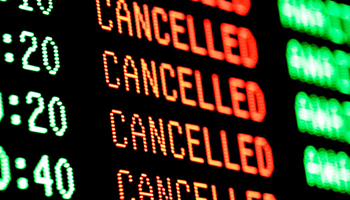New Delhi, Jul 18: Cancelling a flight or denying boarding to a flier is going to cost heavily to domestic airlines as the new guidelines by the aviation regulator DGCA provides for massive compensation in such cases.

As of now airlines offer a meagre amount of up to Rs 4,000 for both denied boarding and cancelling a flight.
The revised compensation has been arrived at after extensive consultations with all stakeholders including the airlines.
Fliers body, Air Passengers Association of India (APAI) founder and president D Sudhakara Reddy, however, has said that the new norms leave certain grey areas which need to be addressed.
Airlines shall pay a compensation of Rs 5,000 or booked one-way basic fare plus fuel charge, whichever is less for cancelled/ delayed flights having a block time of up to one hour in addition to refund of ticket, in case a flier has not been informed by the carrier as per the DGCA norms.
In the case of an airline cancelling/delaying its flight over one hour but up to two hours the compensation amount will be Rs 7,500 or booked one-way basic fare plus fuel charge, whichever is less, besides the refund amount, according to the revised norms.
An amount of Rs 10,000 or booked one-way basic fare plus airline fuel charge, whichever is less, will be the compensation for flights having a block time of more than two hours, according to the new compensation norms.
Block hours refer to the period when an aircraft pushes back from its departure gate till the moment it reaches the arrival gate. These hours are used to calculate an airline?s on-time performance (OTP) besides determining the compensation in the eventuality of a flight getting cancelled or delayed.
In case of denied boarding, airline will have to pay an amount equal to 200 per cent of booked one-way basic fare plus airline fuel charge, subject to maximum of Rs 20,000, in case airline arranges alternate flight that is scheduled to depart within 24 hours of the booked scheduled departure, as per the revised norms.
An amount equal to 400 per cent of booked one-way basic fare plus airline fuel charge, subject to maximum of Rs 20,000, will have to be paid to a flier in case airline arranges alternate flight that is scheduled to depart beyond 24 hours of the booked scheduled departure, as per the revised norms.
In case passenger does not opt for alternate flight, refund of full value of ticket and compensation equal to 400 per cent of booked one-way basic fare plus airline fuel charge, subject to maximum of Rs 20,000, will have to be paid to a flier, it said.
We have strong objection to certain issues. The operating airline would not have the obligation to pay compensation in the situations which are beyond the control of the airline including political instability and delays on the part of air traffic control, among others. How can the ATC delays be a reason for compensation and this leaves the decision in a grey area and will lead to many disputes. It is also not transparent ," Reddy questioned.
"Also, since no financial compensation shall be payable to passengers who have not provided adequate contact information at the time of making booking or when the ticket for firm travel on the selected flight is issued. This will lead to dispute settlement mechanism and which agency will be the responsible agency and in what time frame. This is especially true when it comes to transit passengers/connecting international passengers ," he said.
Besides, the burden of proof concerning the questions as to whether and when the passenger has been informed of the delay of the flight shall rest with the operating airline, Reddy said adding, " this is a grey area and leaves the burden of proof in the hands of the airline and can?t be accepted."





Comments
Add new comment